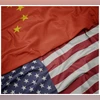China is bracing itself for an uncertain future as Donald Trump returns to the White House, signalling a volatile period in US-China relations.
Trump's re-election is expected to bring aggressive trade policies, including tariffs as high as 60 per cent on Chinese goods, potentially disrupting global supply chains and impacting China's economic growth, CNN reported.
With new technology restrictions and Trump's expected hard-line stance on Beijing, the superpowers' already fragile relationship may face further strain.
But while Trump's protectionist trade stance and transactional approach to foreign policy could put significant pressure on China, it may also lead to opportunities for Beijing. As Trump's stance threatens US alliances and global leadership, Beijing sees a potential to fill the vacuum left by an "America First" approach and to assert a new global order less reliant on the US, reported CNN.
"Trump's return to power will certainly bring greater opportunities and greater risks for China," said Shen Dingli, a foreign policy analyst based in Shanghai. "Whether it eventually leads to more risks or more opportunities depends on how the two sides interact with each other."
Officially, China's response has remained neutral. In a statement, the Foreign Ministry said on Wednesday it "respected" the American electoral outcome, while Chinese President Xi Jinping congratulated Trump on Thursday. Trump has often praised Xi, calling him "a very good friend," despite the marked downturn in US-China relations during his first term.
More From This Section
Xi conveyed to Trump that both countries should "find the right way" to "get along in the new era," as stated by the Foreign Ministry. Yet beneath the calm official statements, Beijing is preparing for what could be an era of increased uncertainty.
"Trump is a very mercurial person," said Liu Dongshu, assistant professor of international affairs at the City University of Hong Kong. "It remains to be seen whether he will implement, and to what extent, the policies he promised during the election campaign, and if he will stick to his first-term agenda."
During his first term, Trump enacted sweeping trade tariffs on China, blacklisted telecom giant Huawei, and placed blame on Beijing for the COVID-19 pandemic. By the end of his term, bilateral relations had reached their lowest point in decades.
Trump has now indicated plans to impose 60 per cent tariffs on all Chinese goods, a punitive measure that could further destabilise China's economy, already grappling with a property crisis, low consumer demand, and rising government debts, reported CNN.
Analysts warn that these tariffs could slash China's growth rate by two percentage points, nearly half of the country's projected annual growth rate of 5 per cent. The Chinese economy is already struggling with a property crisis, low consumer demand, and rising government debts.
Investment bank Macquarie forecasts that tariffs at this level could slash China's growth rate by two percentage points, nearly half of the country's projected annual growth rate of 5 per cent.
"Trade war 2.0 could end China's ongoing growth model, in which exports and manufacturing have been the main growth driver," wrote Larry Hu, chief China economist at Macquarie, in a recent research note.
Unlike prior Republican leaders, Trump's unconventional style of policymaking adds to the uncertainty Beijing faces. "Trump began his first term as an enthusiastic admirer of Xi Jinping, before levying tariffs and then vilifying Beijing during the pandemic," said Daniel Russel, vice president at the Asia Society Policy Institute. "So, Beijing is likely to approach the President-elect with caution -- probing to ascertain which Trump to expect and where there may be opportunities to exploit."
Despite the risks, Beijing also recognises the potential advantages of Trump's "America First" stance. "Although Beijing is deeply concerned about the unpredictability of Trump's China policy, it reminds itself that challenges also bring opportunities," said Tong Zhao, a senior fellow at the Carnegie Endowment for International Peace.
Beijing sees an opportunity to build closer ties with Europe, which may reject Trump's tariffs and technology decoupling efforts, as well as other regions wary of US aggression.
)